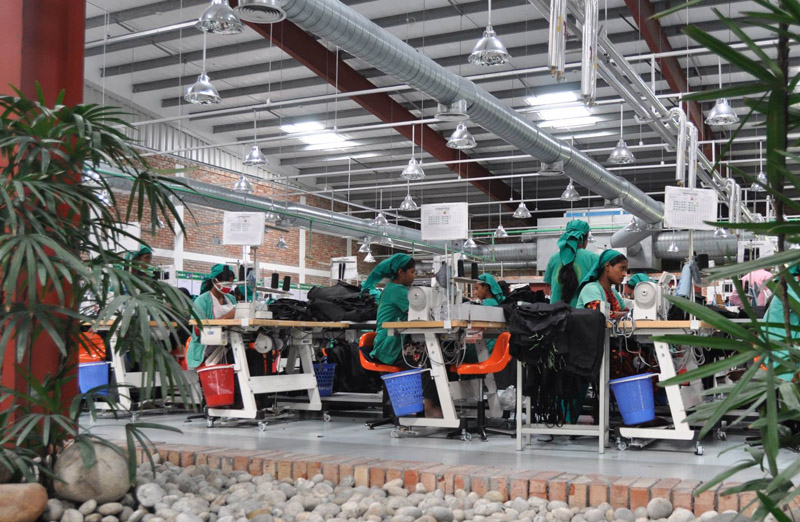News Flash
News Flash

DHAKA, Nov 10, 2025 (BSS) - A strategic consultation meeting was held in Dhaka today between representatives of Bangladesh’s export-oriented garment sector and the visiting United Nations mission from UN-OHRLLS (United Nations Office of the High Representative for the Least Developed Countries, Landlocked Developing Countries and Small Island Developing States).
The meeting discussed the independent assessment of Bangladesh’s preparedness for graduation from the Least Developed Countries (LDC) category.
During the session, Bangladesh Garment Manufacturers and Exporters Association (BGMEA) President Mahmud Hasan Khan underlined the macroeconomic vulnerabilities faced by the country and highlighted the pressing need for policy reforms and targeted support to tackle post-graduation risks.
He emphasized the challenges confronting the garment industry and stressed the importance of collaborative, predictable, and industry-friendly policy measures to sustain growth momentum, said a BGMEA press release.
The meeting was held today at the UN House in Gulshan with the participation of leaders from key trade bodies. Alongside BGMEA President Mahmud Hasan Khan, the discussions were joined by BKMEA President Mohammad Hatem, Executive President Fazlul Shamim Ehsan, BTTLMEA Chairman and BTMA Director Hossain Mehmud, BGMEA Director Faisal Samad, former BGMEA Director Sharif Zahir, and former BGMEA Director and Chairman of the Standing Committee on FTA & PTA Lutfe M Ayyub.
President Mahmud Hasan Khan stated firmly that Bangladesh’s RMG industry is simultaneously confronting rising operational costs and infrastructure bottlenecks at this critical juncture of LDC graduation. He noted that gas prices increased by 286% between 2016 and 2023, followed by a fresh hike in April 2025—40% for captive power and 33.33% for industrial use—severely disrupting production capacity.
He further pointed out that the export sector is facing immense logistics challenges. Despite persistent delays and inefficiencies in port operations, Chattogram Port increased tariffs by 41% in October 2025. Additionally, prolonged transportation time on road networks is hurting global competitiveness. Furthermore, the 56% minimum wage hike in 2023, the annual increment increase from 5% to 9% in 2024, and the 60% reduction in cash incentives without introducing any alternative support mechanisms have collectively pushed the industry towards economic fragility.
The BGMEA President identified key weaknesses in the macroeconomic framework, including slowing GDP growth, inflation remaining above 8%, a low tax-to-GDP ratio (6.6%), and a foreign exchange reserve of US$27.5 billion (as per BPM6).
He also expressed concerns over the current political transition, uncertainty surrounding global trade, reduced buyer orders ahead of the upcoming national election, and coordination gaps in the implementation of Smooth Transition Strategy (STS). He warned that limited product diversification and heavy dependence on imported raw materials could pose long-term threats to economic stability.
During the meeting, exporters shared a set of short- and medium-term priority recommendations for the government and development partners to ensure a stable and well-coordinated transition.
Short-term proposals included: Introducing an alternative incentive package aligned with WTO rules; Lowering bank interest rates; Reinstating the Export Development Fund (EDF) to ease liquidity pressure; Ensuring uninterrupted energy supply; Reducing inefficiencies in ports and customs.
They also stressed the urgency of securing EU GSP+ in the short term and accelerating negotiations on FTAs/EPDAs with major trading partners to retain market access post-graduation.
Medium-term recommendations focused on: Strengthening governance in the banking sector and reducing NPLs; Fast-tracking construction of the deep-sea port and economic zones; Investing in skills development, innovation, and technological modernization to strengthen the industrial base.
Sector leaders also called for uninterrupted energy supply, support for decarbonization investments, and assistance in adopting technology and circular economy practices to ensure sustainable growth.
BGMEA President Mahmud Hasan Khan conveyed specific expectations from international development partners. He emphasized that all developed and developing countries should offer at least a three-year smooth transition period in market access after Bangladesh’s graduation.
He further urged international agencies to provide low-interest financing or blended finance and necessary technical assistance to preserve global competitiveness and support environmental transformation.